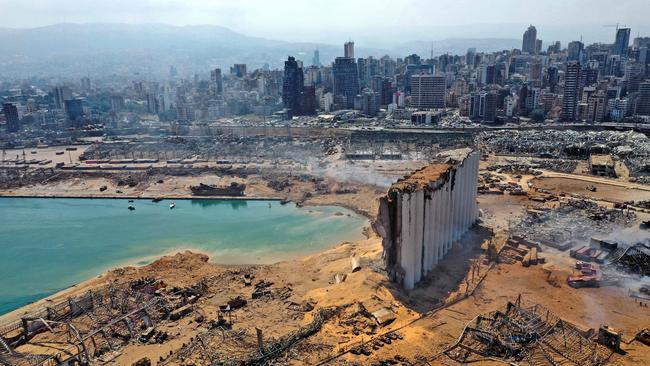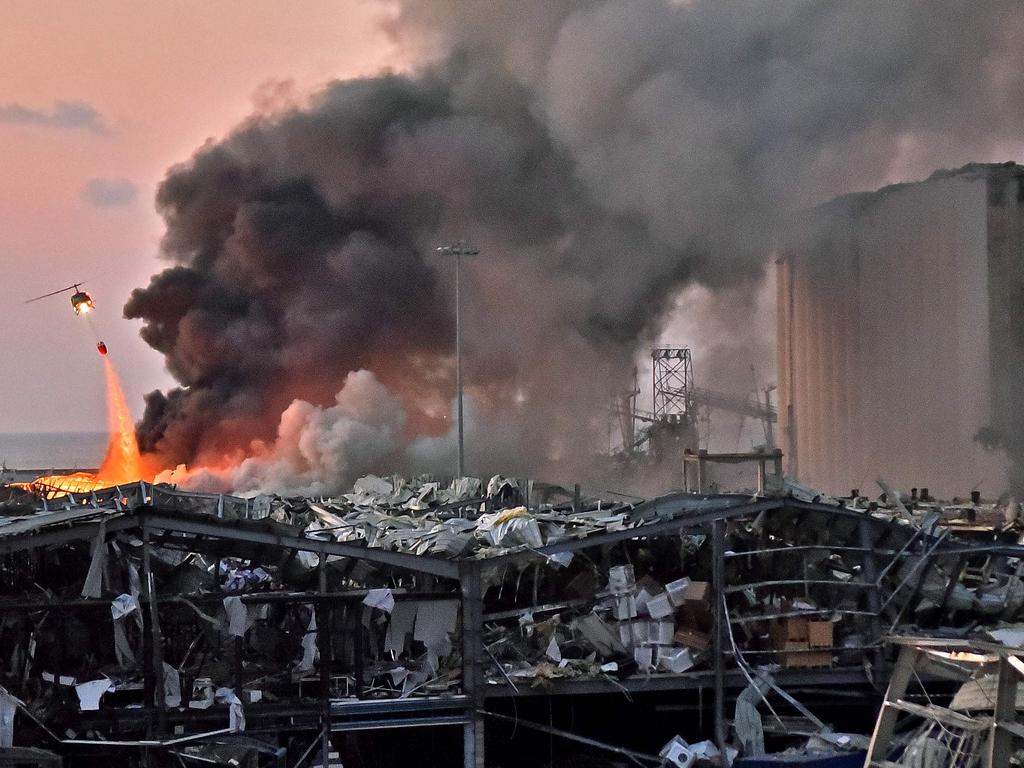Beirut blast: Arrests over ‘apocalypse’ that left city in agony
Beirut port officials placed under house arrest as the city’s dead lie in rubble and thousands are treated in hospital carparks.

Extraordinary videos from Beirut have captured both the terror of Tuesday’s mammoth port blast and the fortitude of its long suffering residents who have endured civil war, political assassinations and tenuous relations with its neighbours.
As Lebanon officials placed port executives under house arrest while an investigation continues about the storage of 2750 tonnes of ammonium nitrate in warehouse number 12 – believed to have been the source of the enormous blast and seismic shockwave – Beirut citizens are continuing to search in the rubble for survivors and to treat the thousands of people injured. Officials say the death toll is now 175 with 5000 people injured.
In one Beirut home, an elderly lady plays Auld Lang Syne on the piano as another family member avoids jagged glass and shredded possessions to begin a clean up.
The huge explosion occurred at 6.09pm local time on Tuesday, with a blast equivalent to a magnitude-3.5 earthquake that could be felt as far away as Cyprus, almost 250km across the Mediterranean.
The blast, followed by an enormous orange fireball, destroyed buildings, flattened houses and tossed cars off a nearby highway as if they were toys.
The CBD was the worst-hit area, but significant damage was reported in Beirut suburbs more than 10km from the port.

Beirut City Governor Marwan Aboud, crying at the site of the explosion, said the scale of the damage was so enormous that Beirut had suffered a “national disaster akin to Hiroshima’’ and the number of people killed was expected to skyrocket. He said thousands of people had been made homeless and the recovery mission would cost the country as much as $US5bn ($6.92bn).
At the Australian embassy, next door to the Government Palace, huge reinforced glass windows were shown on the street, blown out and buckled by the explosive force.
Throughout the day there were periodic snatches of good news. At one collapsed building, locals roared ”Issam is alive,’’ as a man was removed from the rubble and placed on a stretcher. At another site, three of five people buried under buildings were found alive.
But scores of others remain missing, with families and friends posting on an Instagram page for news about their loved ones.
Tatiana Hasrouty asked for information about her father and his colleagues “in the rubble of the silos’’.
“We urge the authorities to act NOW before it’s too LATE,’’ she pleaded on the Instagram page dedicated to missing people in Beirut, adding “Please pray for my father and his missing colleagues.’’
Another simply said: “Jihad Assad Omar is missing. Last located at Beirut port.’’
The international community has rallied around Lebanon, with offers of help from the European Union, which is sending 100 emergency workers and specialised search equipment to the country. Britain has already dispatched emergency medical support and has offered a Royal Navy ship to help assess the damage, foreign secretary Dominic Raab said. France has also mobilised extensive equipment and supplies.
Major buildings around the world are being lit up in the colours of the Lebanon flag, including the city hall in Tel Aviv.

Beirut residents remain in shock and are angry at the official incompetence and negligence that allowed known ammonium nitrate, a lethal chemical, to be stored for years at the port.
Reuters reported that a team inspected the chemicals six months ago and was warned it could “blow up all of Beirut” if not removed.
The chemical had been stored at the port since 2013 after being offloaded from a Russian-owned but Moldovian-registered cargo ship, the MV Rhosus, which at the time was dubbed “a floating bomb’’ in Lebanese courts.
Over the past six years there have been repeated warnings about the dangerous chemicals in court cases and official inspection documents.
A welder fixing a hole to prevent theft at the port was reported in local media as sparking the initial fire next to the warehouse where the ammonium nitrate was stored. When the fire spread and ignited the highly combustible chemical stash — commonly used for fertiliser but also by terrorists — it erupted in a monster fireball, triggering a seismic shockwave, killing firefighters, security and port officials and decimating much of central Beirut.
One Australian was killed, Scott Morrison said, confirming the Australian embassy was damaged and its staff suffered cuts.
“Our hearts go out to all of those in Lebanon and in Beirut in particular at the moment,’’ the Prime Minister said.
The terrifying blast was captured during a live stream of a mass being conducted by a priest at the Paroisse St. Maron Baouchrieh church.
The video shows the church shaking, and the priest running for an exit as stained glass windows explode and the roof begins to cave in. It’s believed he and the parishioners inside the church did not suffer serious injuries.
In another video, from the BBC offices around the corner from the church, BBC Arabic journalist Maryem Taoumi is seen conducting an online interview when she suddenly looks up in response to a loud noise before she is flung from her chair and the screen fills with red smoke.
Ms Taoumi was heard whimpering in shock as her interview subjects looked on in horror.
Nearby, at the same time, a bride is posing for her wedding photos on the happiest day of her life, when the video cameraman suddenly turns away as the shockwave hits. It then pans back to her as she is seen running for cover with members of her wedding party.
Meanwhile the verdict in the politically sensitive tribunal of the assassination of ex-Prime Minister Rafic Hariri has been postponed from this Friday until August 18 because of the devastation across the city.

The deadlocked Lebanese government now faces huge challenges to feed its people. The destroyed port was the main access point for a country that imports 85 per cent of its grain.
Lebanon was already struggling after an 80 per cent plunge in the local currency in recent months, with the lower classes becoming destitute and the middle class scrambling to pay for basics.
As well as silos of grain, the blast destroyed a storage facility holding medical supplies delivered only recently to help with the COVID-19 crisis.
At the time of the explosion, the silos were only 20 per cent full and four ships carrying 28,000 tonnes.
One witness in Beirut, Sarah Moussa, told The Australian: “This city is in a state of agony, a state of pain. I am seeing an apocalypse.”
On Wednesday evening, officials said the death toll was 100, with a further 4000 injured, amid fears the disaster would spark widespread food shortages and more political unrest in the region.
The explosion was the biggest on Lebanon soil and is a devastating blow to a nation that in recent times has been crippled by an economic crisis and is experiencing a disastrous surge in coronavirus infections.

A witness outside the Australian embassy said “windows have been blown out and there appears to be extensive damage to the top two floors. Parts of the building have fallen to the street and there is broken glass everywhere.’’
Overwhelmed hospitals, also damaged, saw doctors treating patients in carparks and hundreds of injured turned away. When the blast occurred, Peter Noun, the head of paediatrics oncology at St George Hospital, said parents of cancer-stricken children panicked, ripped out IVs and rushed them outside.
Equipment to set up field hospitals was due to arrive in Beirut from France, Qatar and Kuwait on Wednesday night, with Paris, the Czech Republic and Holland also sending search and rescue teams.
Ms Moussa, The Australian’s translator in Beirut, said the scenes around her were “really, really bad’’. She said she ran into the street when she felt the blast.
In a series of messages to The Australian, she said: “People are shouting, motorcycles are screaming by, every single window is smashed, every single window.
“Through all the (shattered) windows, people are crying, people are bleeding, some of the windows fell on cars on the street.’’

Australian Priscilla Zaitouni said her apartment building windows were shattered, despite being 10km from the port. “I heard a whistling and then a massive blast,” she said. She and her father, George, were trying to find supplies for city hospitals. “I’ve seen a surgery performed on a bed basically out on the street,” she told Sydney radio station 2GB.
Dubai-based Australian Adam Malouf was in Beirut at the time and told 2GB: “There was something like a sonic boom you hear from a supersonic jet.’’
There are normally 20,000 Australians, some dual nationals, in Lebanon at any one time.
Additional reporting: Ben Packham








To join the conversation, please log in. Don't have an account? Register
Join the conversation, you are commenting as Logout